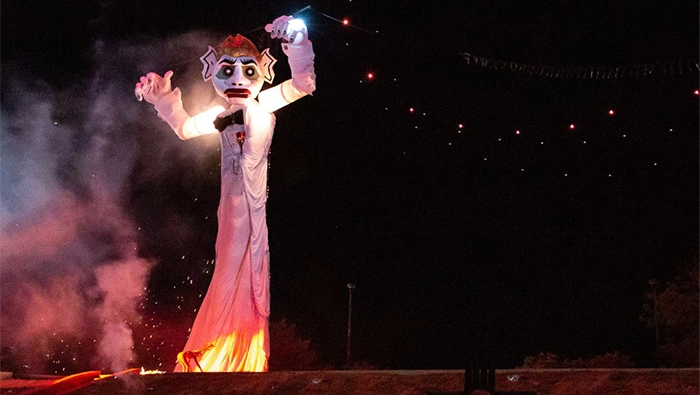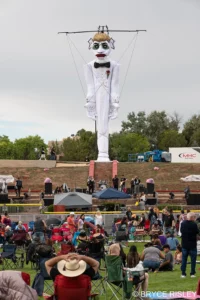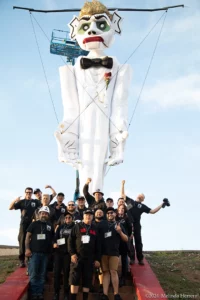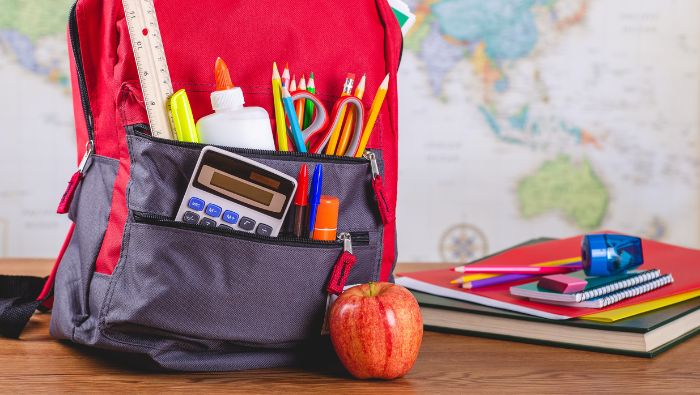
Santa Fe celebrates 100th burning of Zozobra
A Kiwanis club in New Mexico, U.S., keeps the project’s flame alight by including the community.
By Erin Chandler
Ray Sandoval clearly remembers the start of his Kiwanis journey. He was a six-year-old in Santa Fe, New Mexico, U.S.
“I think that, obviously, as a young kid, I got involved with Kiwanis because we burned this 50-foot monster in the middle of our town.”
The monster is Zozobra, whose Spanish name means “anguish, anxiety or gloom.” He is a huge marionette constructed of wood, wire and cloth, and he is stuffed with the various “glooms” that people want to leave behind: divorce papers, old police reports, medical records and scraps of paper scrawled with other reminders of unhappiness.

Each year, crowds gather at Fort Marcy Park on the Friday before Labor Day — a U.S. holiday that occurs on the first Monday of each September — to watch Zozobra burn to the ground, taking the gloom of the past year with him.
The annual Burning of Zozobra began in 1924, when artist William Howard “Will” Shuster, Jr., inspired by traditions of the Yaqui Indian communities, burned an effigy at a party for a group of fellow artists and writers. The event grew in size and scope, acquiring its own set of characters and traditions. In 1964, Kiwanian Harold Gans persuaded Shuster to hand the event over to the Kiwanis Club of Santa Fe, with proceeds to benefit the community’s children.
For Sandoval, who has served as event chair since 2013, the appeal of Zozobra is the opportunity for people to let go of their individual pain and regret — and to let them share that catharsis in “this super community event with 60,000 of your closest friends.”
And there’s this: “You know, we as human beings — we love fire.”
Keeping a promise
Once sparked by his youthful fascination with Zozobra, Sandoval’s involvement with Kiwanis evolved as he grew into adulthood and realized the importance of community service. But the appeal of the burning monster remained. When Sandoval was 18, Gans told him about a promise Gans had made to Will Shuster to keep Zozobra going “in perpetuity.” Gans asked Sandoval, in turn, to promise to get Zozobra to its 100th birthday.
“Santa Fe is a city that is 400 years old,” Sandoval says. “It has the oldest continuous celebration in the United States, Fiesta de Santa Fe, which celebrated its 317th year this year. Our Native American Indian market celebrated 100 years last year. So promises and commitments really mean something in this community.” Moreover, he says, “for me, as a Kiwanian, when we give our word, it has to be our word.”
On August 30, 2024, Sandoval fulfilled his promise: Santa Fe celebrated the 100th Burning of Zozobra. Around 65,000 people attended the event in person, with almost 300,000 watching on television and 1.3 million online.
The path was not without obstacles. In 1999, concerns about providing security to both Zozobra and the Fiesta de Santa Fe led the city to move Zozobra to a Thursday night. Over the next decade, crowds dwindled, with few children able to attend because they had school the next day.
The Kiwanis club began to question whether Zozobra was living up to its purpose — and worth the resources required. By then, every aspect of Zozobra was steeped in almost 90 years of tradition. Would changing those traditions take away what made the event special in the first place?

Renewed focus
The answer came with a change in leadership. When Sandoval assumed the position of event chair, he brought the philosophy that Zozobra was special because the community came to celebrate and burn their gloom together. So the club set about recentering the event around the community.
The first step was to move the event back to the Friday night at the start of the three-day Labor Day weekend — allowing more children to return and people from out of town to bring their families.
The second was to get the community involved. For years, the construction of Zozobra had been handled by the Kiwanis club alone, following a strict set of instructions and shrouded in secrecy. Now the club invited members of the public to touch and see Zozobra up close — and even, with proper safety measures, help build him.
For those who weren’t interested in operating power tools, there were other jobs — in security, hospitality and marketing. Ross Hamlin, who played with the Zozobra band, even composed original music for the 2024 burning.
Where the club had previously recruited artists for Zozobra T-shirts and posters, they decided to hold contests for adults and children to determine each year’s designs. Another contest determined who would sing the national anthem before Zozobra was set alight.
There’s a lot of talent in the community, Sandoval says, but it’s up to the club to seek it out.
“You’ve got to invite them there. You’ve got to make them feel welcome, and you’ve got to put in the time and energy to cultivate their skills, so that way they feel like they’re giving something back. And then, once that happens, it’s a magical solution, because they’re never going to want to leave.”
A spirit of open-mindedness
That policy of openness extended to the area surrounding the venue where Zozobra is burned. At first, neighbors and local businesses resented the inconvenience. The club committed to holding meetings and keeping up an honest dialogue on improvements in areas like cleanup, security, barriers and creating pathways for residents to enter and exit their neighborhoods.
The spirit of open-mindedness and honesty was key in balancing old and new traditions within the club as well. Not everyone was eager to embrace change. Finding a way forward has been “like walking a tightrope in some respects,” Sandoval says. “Those different perspectives give us the ability to make the event stronger and make the bonds between the club [members] stronger.
“One of the worst things, I think, for a club or a tradition is to do it the way you’ve always done it because you’ve always done it that way. That is the best way to fail.”
Early on, Sandoval realized that Zozobra “was going to become kind of a bucket-list item” that people only attended once. Again, the club reached out, asking the kids in the Zozobra art contest what they liked about the character. All of them drew Zozobra looking the same as he always did, with a black bow tie and cummerbund — but they liked that his hair color changed.
Inspired by this, the club launched the Decades Project: Every year leading up to the 100th burning, Zozobra would change his appearance to represent a different decade. Sandoval admits that this deviation from tradition led to “a ton of controversy” and some “really intense conversations” both inside and outside the club. Some called for a return to the “traditional Zozobra” halfway through the project. But the club stuck with it, and by 2024, what Zozobra would be wearing had become a hot topic of conversation. The kids’ art contest this year had 600 entries, with Zozobras wearing crocs, a backpack, AirPods, even playing a Nintendo Switch.
“People have now begun to love the fact that he’s dressed differently,” Sandoval says. “And so even with the secret sauce — the tradition itself — you can’t be afraid to mix that up, and you can’t be afraid of criticism. You’ve got to look at exactly what’s your target audience. My audience is those young people. I need to get them excited, and they need to be the next generation of Kiwanians that give back to their community and also keep this tradition alive. And I think that’s where we succeeded.”

Growing globally
Zozobra has adapted to reflect its community in other ways. Construction materials have been adjusted to withstand higher winds caused by climate change. The performance now includes Native American dancers to better represent the multicultural Santa Fe community.
As the emphasis on community has taken hold, the Burning of Zozobra has grown globally. In the first year that the event returned to Friday night, attendance rose from 20,000 to 30,000. It continued to increase until 2022, when attendance neared 75,000 — more than was safe for the venue. After that, in-person attendance was capped at 65,000, and the club decided to partner with the local ABC television affiliate to broadcast Zozobra.
Despite concerns that broadcasting the burning would decrease in-person attendance and merchandise sales, the event has continued to sell out every year, and it has gained partners and sponsors as its reputation spreads around the world.
Ahead of the 100th burning this year, the club held the ZozoFest art show, with hundreds of pieces made by community members depicting Zozobra, fire dancers and more. A “public stuff party” for community members to help fill Zozobra with glooms — in exchange for pizza and ice cream — saw volunteers waiting outside the door at 9 a.m. By 1 p.m., there was nothing left to stuff. The neighborhood association that had asked Zozobra be stopped or moved in 2012 sent a US$5,000 donation to assist the “good work” the club now does with the event.
In addition, the city of Santa Fe now boasts a Zozobra statue and has paid for a 135-foot Zozobra hot air balloon. It has also asked the Kiwanis Club of Santa Fe to host official events for the Fourth of July, New Year’s Eve and Dia de los Muertos.
Some club members had initially objected to nonmember involvement with Zozobra preparations, thinking the strategy would remove an incentive for becoming a Kiwanian.
Sandoval countered that participation would show people what the club does for the community and for children — and inspire them to become members. “And that’s exactly what we’ve seen,” he says now. “As our old members either retire or unfortunately pass away, we’re seeing that they’re being replaced with younger and younger leaders.”
Jacob Romero, a past president of the Kiwanis Club of Santa Fe, was 26 when he took office, having joined the club at 21 — after becoming involved with Zozobra at age 8. As they become known for the way they run events, Kiwanis club members have become “the cool kids” in Santa Fe. Sandoval believes this is how Zozobra will keep growing into the future.
“It has to be that we plant those seeds of future leaders now, and we cultivate and water those.”
The time is now
The Santa Fe club’s success has given Sandoval some insight into the ways that club events connect to the communities around them. For example, he suggests building events around events or interests that already exist in your area.
“But also look to see if there are cultural, historical things in your community where you can create an event,” he says, “because those events become so important to the people who are there.
“And don’t be afraid that you don’t have a big enough club to handle the event. Start your event, and then go out and talk about it — welcome strangers in, welcome nonmembers in. Before you know it, you’re not only going to bring your community together, you’re going to bring your club together.”
Sandoval believes that such togetherness is especially powerful these days.
“I know service organizations are having a rough time,” he says, “but if there is a time for service organizations, it is now. We need to create community events where we start seeing each other as neighbors and people again.”
This year, at the 100th Burning of Zozobra, Sandoval had a moment that he compared to the end of the movie “Return of the Jedi.”
“It was almost as if I could see these two Force ghosts,” he says. “I could see Will Shuster standing there with his little hat on, and I could see Harold [Gans] there in his overalls, and it was really emotional. So when Zozobra fell, it was this huge weight that fell down as well. I just remember thinking to myself and saying to Shuster and to Harold, ‘We did it. We got to the 100th, and we’re still going to go on.’
“We’re strong. We’re going to continue to do what Harold promised, which was to have Zozobra in perpetuity — which is a long, long time.’”


